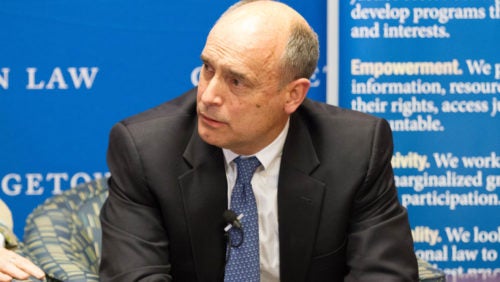Georgetown Law Hosts Conference on Rule of Law Approaches to Countering Violent Extremism
May 9, 2017

Visiting Professor James Baker, the retired chief judge of the U.S. Court of Appeals for the Armed Forces who chairs the ABA Standing Committee on Law and National Security, moderated a discussion on extremism in the 21st century.
On May 4, Georgetown Law hosted “Rule of Law Approaches to Countering Violent Extremism,” a conference of the American Bar Association’s Rule of Law Initiative (ROLI). And with expertise in so many relevant areas — national security, criminal justice, international law — members of the Law Center community contributed far more than the venue.
“I’m very proud that so many leading the discussions are from Georgetown Law,” Dean William M. Treanor said at the start of the event.
Judge Margaret McKeown (L’75, H’05) of the U.S. Court of Appeals for the Ninth Circuit, who chairs ROLI, moderated a session with Associate Dean Rosa Brooks on the relationship between the rule of law and violent extremism.
“The causes of violent extremism often turn out to be multiple, complex and highly localized,” Brooks said, citing a ROLI issue paper. Mental health issues that are a factor in one country, she noted, may play no role in others; poverty and religion are not predictors.
Yet the rule of law has been found to reduce the likelihood of terrorist events, Brooks said. Additional studies have found a correlation between the degree to which a state curtails civil and political rights and the likelihood that terrorism will occur.
Visiting Professor James Baker, the retired chief judge of the U.S. Court of Appeals for the Armed Forces who chairs the ABA Standing Committee on Law and National Security, moderated a discussion on extremism in the 21st century.
“Most of the kids who join ISIS are 14, 15, 16, 17 years old…” NPR Correspondent Dina Temple-Raston noted. “If all you did was click…on websites, does that make you as dangerous as someone who goes to an Al-Qaeda camp?”
Effective responses
What exactly is the rule of law? “The way I think of rule of law is as a restriction on the arbitrary exercise of power of government, by basically subordinating it to some sort of well defined and established laws,” Professor Laura Donohue commented in a wrap-up session moderated by the ABA’s Linda Bashai (L’91).
Donohue, along with Professors David Koplow, Marty Lederman, David Luban and Visiting Professor Stephen Rapp, participated on panels examining effective criminal justice responses to violence, expanding personal freedoms and opportunity, and building community resilience.
“We are very lucky to be here [at] my alma mater,” McKeown said at the outset. “Putting this together in collaboration with Georgetown has been a real joy.”